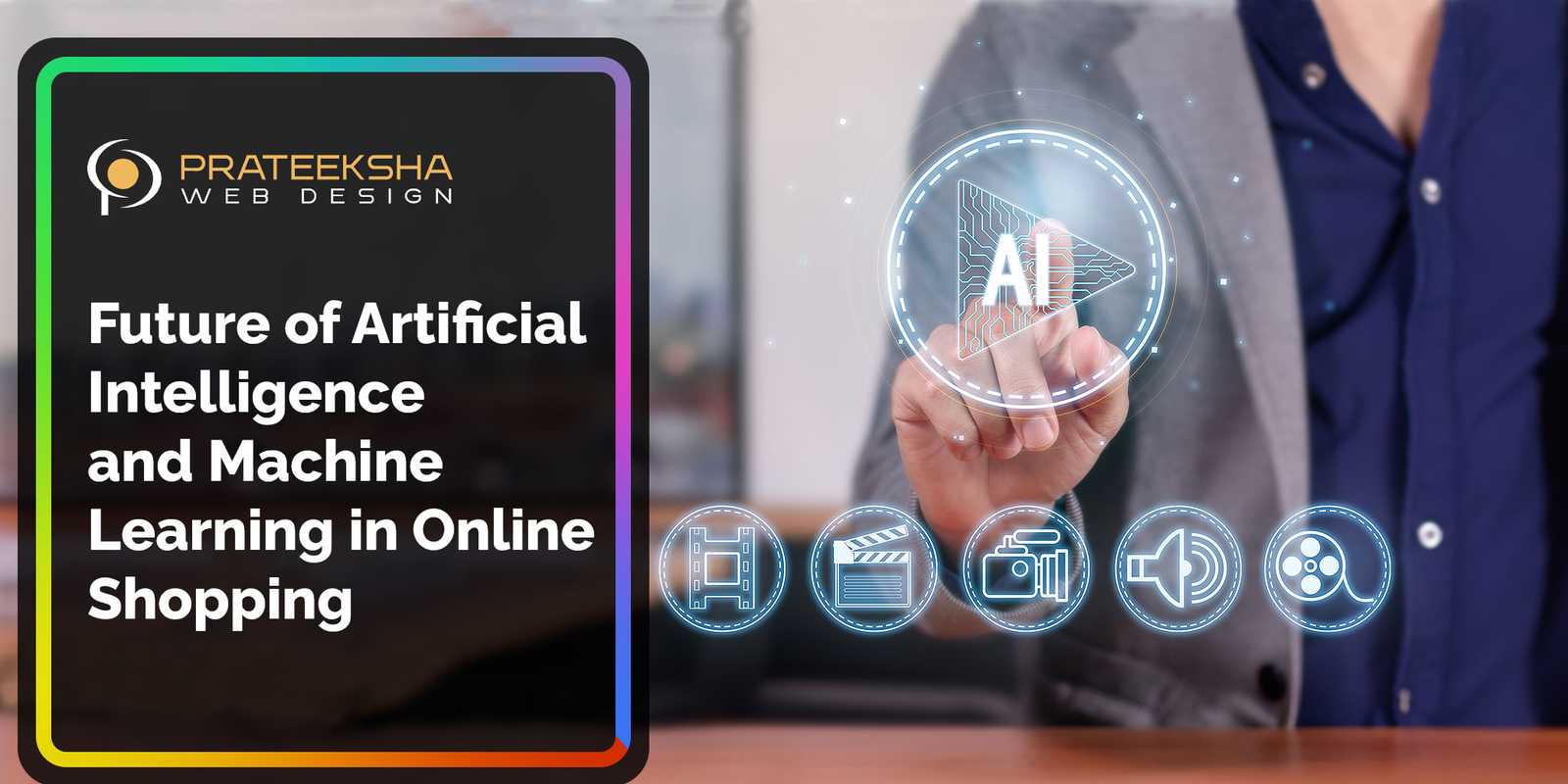The era of digitization has brought about a revolution in the way we shop, altering the landscape of the eCommerce industry. As an avid observer and participant in this transformation, I can't help but marvel at the incredible potential of Artificial Intelligence (AI) and Machine Learning (ML) in reshaping the future of online shopping. From the time we log in to an online store to the moment we receive our orders, AI silently works in the background, ensuring a seamless, personalized, and efficient experience.
Imagine walking into a store where the prices of products are optimized just for you, where the risk of fraudulent transactions is next to nil, and the search results always hit the mark. Sounds too good to be true, doesn't it? But with AI and ML, this is not just a possibility; it's becoming our reality.
The integration of AI in eCommerce is a testament to the merging of technology and commerce in the most advantageous ways. With each passing day, the tools and technologies are becoming more sophisticated, promising an even more streamlined and personalized shopping journey for every individual.
Here’s a sneak peek into the marvels we can expect:
Personalized Shopping Experience:
The Evolution of Personalization in eCommerce:
With the massive amounts of data generated by online shoppers, AI harnesses this information to provide a tailored shopping journey. This isn't just about showing product recommendations; it's about creating an entire shopping experience that feels unique to each user.
Behavior Analysis: AI studies patterns such as browsing habits, click-through rates, time spent on pages, and purchase history to understand individual preferences.
Dynamic Content Display: Based on user data, AI can change the content a user sees, from product listings to banners and promotional offers, making them more relevant to the individual's tastes.
Re-engagement Strategies: AI can predict when a user is likely to churn and deploy targeted email campaigns or ads to re-engage them.
Stitch Fix:
AI Implementation: Stitch Fix uses AI-driven algorithms to personalize clothing choices for its subscription boxes. It analyzes purchase data to predict what styles its customers will want next.
URL:
Fraud Protection:
Building Trust in the Digital Marketplace:
Fraud can be catastrophic for both businesses and consumers. AI's predictive analysis and pattern recognition capabilities play a crucial role in safeguarding online transactions.
Real-time Fraud Detection: AI systems analyze thousands of transactions per second to flag anomalies instantly.
Multi-factor Authentication: By learning user behaviors, AI can identify when a user's typical login pattern changes and might trigger additional authentication steps.
Predictive Risk Scoring: Every transaction can be assigned a risk score based on historical data and other determining factors, allowing businesses to take preventive measures.
Optimized Pricing:
Smart Pricing for Competitive Advantage:
In a dynamic market, static pricing no longer makes the cut. AI's dynamic pricing models consider multiple factors to set the ideal price point.
Market Demand Analysis: AI algorithms continuously assess market demand for specific products, adjusting prices to match current conditions.
Competitor Price Tracking: AI tools can track competitors' prices in real-time, allowing businesses to adjust their pricing strategies accordingly.
Personalized Pricing: Beyond broad market dynamics, AI can even craft personalized pricing strategies, offering discounts or incentives to specific users based on their shopping behavior.
Optimized Search Results:
Enhancing Discoverability in the Digital Storefront:
The quality of search results can make or break the shopping experience. AI goes beyond mere keyword matching to understand user intent.
Natural Language Processing (NLP): Allows search engines to comprehend context and semantics, delivering results that match the intent behind a search query.
Image Recognition: Some advanced search engines, powered by AI, allow users to search with images, finding products that match or are similar to the uploaded image.
Learning from Interactions: The more a user interacts with the search engine, the smarter it becomes. If a user often clicks on the third or fourth result, the AI can adjust future search results based on those preferences.
These enhanced capabilities of AI in eCommerce domains like personalized shopping experiences, fraud protection, optimized pricing, and search results optimization are setting the stage for a revolution in online retail. The result is a more intuitive, secure, and satisfying shopping experience for consumers and increased profitability and efficiency for businesses.
eBay:
AI Implementation: eBay uses AI for various functions like personalized search, image recognition, and chatbots for customer service. Its chatbot, for instance, can answer queries, assist in shopping, and handle disputes.
Visit eBay
Product Recommendations:
Guiding Shoppers to Desirable Products:
The power of AI-driven product recommendations lies in its ability to connect shoppers with products they may not even realize they want.
Historical Data Analysis: AI systems consider a user's past purchases, browsing patterns, and even items they've added to wish lists or carts but never purchased.
Collaborative Filtering: This method gauges products by analyzing behaviors of similar users. If users A and B both liked product X, and user A liked product Y, there's a chance user B will also appreciate product Y.
Contextual Recommendations: Depending on the time of day, current sales, or even current events, AI can tweak product suggestions. For instance, suggesting umbrellas during a rainstorm.
Alibaba:
AI Implementation: Alibaba uses AI in various facets of its operations. During its Singles' Day sale, Alibaba uses AI to predict what customers might want to purchase. Its virtual fitting room, known as "FashionAI", allows users to mix and match outfits digitally. URL:
Visit Alibaba
Supply and Demand Management:
Balancing Inventory with Consumer Demand:
AI's predictive capabilities play a pivotal role in ensuring businesses neither overstock nor run out of products.
Demand Forecasting: By analyzing historical sales data, market trends, and even external factors like weather or holidays, AI predicts future demand for products.
Inventory Optimization: AI tools assist retailers in deciding how much stock to maintain, reducing carrying costs and the risk of dead stock.
Automated Reordering: AI can automate the reordering process by initiating orders when stock levels reach a predetermined threshold.
Site Search Autocomplete:
Facilitating Swift and Intuitive Product Searches:
A powerful tool for enhancing user experience, AI-driven autocomplete functions predict and guide users to their desired products with minimal input.
Predictive Text: Based on initial letters or words, AI predicts the full search term, often drawing from popular searches or specific user history.
User Behavior Analysis: Over time, the autocomplete function becomes smarter, understanding individual user's tendencies and frequently searched items.
Correction of Typos: Even if users make a spelling mistake, AI can offer corrected search suggestions, ensuring users find what they're looking for.
Improved Customer Service:
Delivering 24/7 Responsive Support:
AI has ushered in a new era of customer service, where queries are addressed promptly, and customer satisfaction is prioritized.
Chatbots: Powered by AI, chatbots can handle a vast range of customer inquiries in real-time, from product information to order status, without any human intervention.
Voice Assistants: For those who prefer speaking over typing, AI-powered voice assistants can guide customers through a website, answer questions, and even assist in the checkout process.
Sentiment Analysis: By analyzing text or voice inputs, AI can gauge a customer's mood and adjust responses accordingly. If a customer seems frustrated, the AI might escalate the issue to a human representative.
Olay (Skin Advisor):
AI Implementation: Olay's Skin Advisor platform uses AI to offer personalized skincare advice. Users take a selfie, and the platform, powered by deep learning algorithms, analyses the skin and recommends products.
Visit: Olay Skin Advisor
Visual Recognition:
Transforming the Way Shoppers Discover Products:
The integration of visual recognition technologies in eCommerce platforms represents a paradigm shift from traditional text-based searches to a more intuitive image-based product discovery.
Image-Based Searches: Instead of describing a product in words, users can upload an image, and visual recognition algorithms will identify and list products that match or are similar to the image. This is especially handy for fashion items, furniture, or any product where design and aesthetics are paramount.
Augmented Reality (AR) Shopping: Visual recognition combined with AR allows users to virtually 'try on' products. Whether it's a pair of sunglasses, makeup, or visualizing how a couch will look in their living room, AR provides a more immersive shopping experience.
Product Tagging & Categorization: Automated tagging powered by visual recognition can categorize products based on their visual attributes, making product listing more organized and search-friendly.
Detecting Counterfeit Products: By analyzing product images, visual recognition can help in verifying the authenticity of products, thus combating counterfeit goods in the market.
ASOS:
AI Implementation: ASOS launched a visual search tool in its app, allowing users to take pictures of clothing they like, which the app then matches with similar items from ASOS's inventory.
URL: ASOS
Voice Search Optimization:
Voice-Activated Shopping — The Future of eCommerce:
With the proliferation of voice-activated devices like Amazon Echo, Google Home, and Apple's Siri, optimizing for voice search is no longer optional; it's imperative.
Conversational Queries: Unlike text-based searches, voice searches are typically longer and more conversational. AI algorithms are trained to understand and respond to these natural language queries, making results more relevant.
Localized Searches: Many voice searches are local in intent, such as "Where can I buy a leather jacket near me?" Voice search optimization ensures that businesses cater to these location-specific queries effectively.
Seamless Integration with Smart Devices: As homes become smarter, the integration of voice search with IoT devices means users can reorder products just by voicing out the command. For instance, while cooking, a user could instruct their smart device to order more olive oil.
Personalized Voice Shopping: Just as with traditional online shopping, voice search optimization can be personalized. Over time, voice-activated assistants learn a user's preferences, making product recommendations and search results more tailored to individual tastes.
Amazon:
AI Implementation: Amazon uses AI for a wide range of purposes, from product recommendations to Alexa, its voice-activated assistant. Their demand forecasting, known as "anticipatory shipping," predicts what customers are likely to purchase and pre-emptively ships out goods to nearby warehouses.
Visit: Amazon
In summary, AI continues to redefine the landscape of eCommerce. Whether it's guiding users to their next favorite product, ensuring supply meets demand, making search intuitive, or offering round-the-clock support, the benefits of AI in the world of online shopping are both undeniable and far-reaching.
Top AI eCommerce software solutions that are available to you now
-
Klevu:
Klevu offers AI-powered site search and product discovery solutions. It enhances on-site search with features like automatic keyword completion and personalized search results.
Integration: Shopify, Shopware, and can be customized for Laravel.
Visit: Klevu
-
Limespot:
Limespot provides personalized product recommendations using AI. It can analyze user behavior to display the most relevant product suggestions.
Integration: Shopify and custom integration possible for Laravel.
Visit: Limespot
-
Recombee:
Recombee offers real-time personalized recommendation solutions driven by AI. It's versatile and can adapt to various eCommerce needs.
Integration: Shopify and custom solutions that can be integrated into Laravel.
Visit: Recombee
-
Chatfuel:
Chatfuel provides AI chatbots primarily for Facebook Messenger, which can help in customer support, sales, and other conversational needs.
Integration: Shopify and can be integrated into Laravel-based stores via APIs.
Visit: Chatfuel
-
Octane AI:
This tool focuses on conversational AI, enabling businesses to set up chatbots, quizzes, and more to engage with customers.
Integration: Shopify and potential custom integrations for Laravel.
Visit: Octane AI
-
Dynamic Yield:
Dynamic Yield offers an AI-powered personalization platform, helping businesses increase conversions through tailored content, recommendations, and experiences.
Integration: While primarily known for larger platforms, it's versatile enough to be integrated with Laravel solutions with the right development approach.
Visit: Dynamic Yield
-
Growave:
Growave provides features like reviews, wishlists, and loyalty programs. It uses AI to offer insights and boost customer engagement.
Integration: Shopify.
Visit: Growave
-
Findify:
Findify delivers personalized search and product recommendations using machine learning. Their solutions adjust in real-time based on user behavior.
Integration: Shopify and can be customized for Laravel.
Visit: Findify
-
Algolia:
While primarily a search platform, Algolia offers AI-powered features to make product search faster and more relevant.
Integration: Shopify, Laravel.
Visit: Algolia
-
Yotpo:
Yotpo focuses on user-generated content, reviews, and loyalty programs. It leverages AI to offer insights and optimize user content.
Integration: Shopify, Shopware, and can be integrated into Laravel.
Remember, while some of these platforms provide out-of-the-box integrations for popular eCommerce platforms like Shopify and Shopware, integrating them into a Laravel-based Custom eCommerce solution might require developer expertise and might not always be straightforward. It's essential to assess the compatibility, features, and costs before making a decision.
Visit: Yotpo
How to get started
Before diving into the integration, you should clearly define what you expect from the AI tool:
- Do you want better product recommendations?
- Are you looking for improved search functionalities?
- Do you need chatbots for improved customer service? 2. Choose the Right Tool:
- From the list provided, select the tool that aligns with your needs. Visit their official websites, read reviews, compare features, and check their pricing models.
Most AI tools offer plugins or extensions for popular platforms like Shopify and Shopware. Go to the respective marketplace (e.g., Shopify App Store) and search for the tool.
Remember, the goal of integrating AI tools into your eCommerce platform is to enhance the user experience, optimize operations, and increase sales. Regular analysis and optimization are key to achieving these goals.



